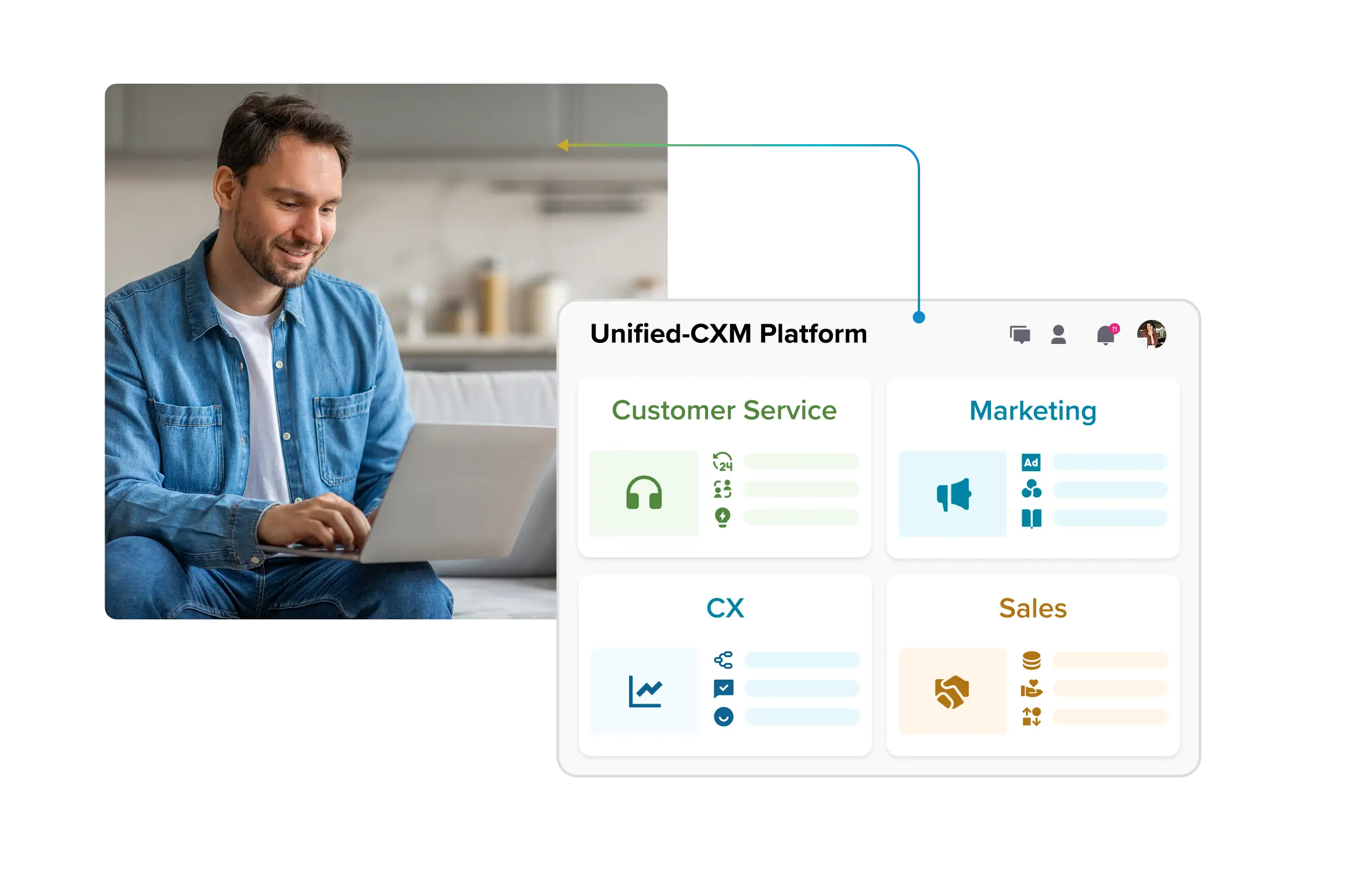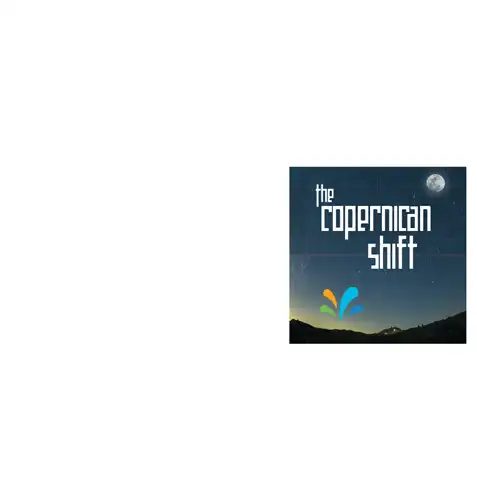The strategic AI-native platform for customer experience management
The strategic AI-native platform for customer experience management Unify your customer-facing functions — from marketing and sales to customer experience and service — on a customizable, scalable, and fully extensible AI-native platform.

Episode #186: Welcome to The Copernican Shift Podcast
That’s right. We’re now The Copernican Shift podcast (formerly the Unified-CXM Experience). And although we’ve changed the name, we haven’t changed the format. We’ll still feature some of the top marketing guests on the planet, and generally continue to challenge your perspectives about marketing, advertising, and digital channels.
I’ve talked about the Copernican Shift before, but in this episode we go a little deeper into exactly what that means, and why it’s critical for marketers to understand.
The Copernican Shift. Mapping perception to reality since 1543.

PODCAST TRANSCRIPT
Just groovin' to my tune here.
When I finally get to go on a real stage, do a live presentation again, this has to be playing in the background. I miss this song so much anyway. Hi, I'm Grad Conn, and welcome to the Copernican Shift. So if you've been following me for the last year and a half, you've been listening to a show called the Unified-CXM Experience. And for a little bit of while before that, probably about six months before that, the CXM Experience, and we're rebranding, classic marketing move, we're rebranding, and we're rebranding to a brand that I've had for a really long time, which is the Copernican Shift.
And the Copernican Shift actually came out of a really interesting discussion I had once, many, many years ago at Gray Advertising. So I'll give you the background on that in a second. But it's also the name of my blog, you know, which is where we post a lot of these. And we're changing the name for a bunch of reasons. One is the Unified-CXM Experience has been great. I'm still a huge believer in unified CXM, especially in my role as CXO at Sprinklr, but we talk about a lot of things besides unified CXM. So there are times when people expect me to only talk about unified CXN every single time. And we're getting into some pretty broad marketing topics. And so I want to give myself just a little bit more freedom from a branding standpoint, to be able to converse about stuff that's outside that potential limitation.
The second thing is, I think people feel like it's maybe too much of a company show, if it's, you know, named after the category that the company is creating. So by going with something that's a little bit more broad scale, and something that I've had for a long time, you know, people will be like, Okay, this is just Grad rattling on about marketing, like he always does. And, as always, and I'll make this comment, I think this might be obvious, but it may not be, I don't make any money off any of this. So I've never put an ad on my blog. I've never put an ad on the podcast. I don't even track my traffic. Once Randy accidentally showed me traffic on the blog, and I was like, Oh, my God, my eyes are burning. Turn that off right now. And you know, this is mostly done for me, in a way, and secondarily, for my team, and I'll explain what I mean by those things.
So when I first began blogging, I took Cory's philosophy and this, I guess, for me, it's about 20 years ago now and I just write stuff I want to write about stuff I care about. And if no one ever reads it, that's okay, because I've got it, and I can go back to it. Now, I have added a second layer to this philosophy that Cory would probably agree with, I've never really asked him. But because Cory doesn't have employees. And he's not leading a company, he's able to sort of stay in that first lane. But I have a second very important lane. And that, you know, I'm a marketing leader, I have a lot of people on my team who depend on me and look to me to help them do their jobs and look to me to do their evaluations and promotions, etc. And I have a very significant responsibility to train and develop that team. And so probably five or 10 or so years ago, I began to write more articles on my blog that were essentially items I wanted my team to read. So today, if you were to do a Google search on how to write a Procter and Gamble recommendation, or how to write a P&G recommendation, the number one search result will be an article I wrote on how to write a P&G recommendation, and the ABCs of selling, which is the P&G selling method. And I think I'm the top result for that as well and a bunch of other things.
So I have a very, very good friend named Cory Doctorow, who I have not seen in an awfully long time. But Cory and I started a company together called Open Cola. But we did a lot of things together long before Open Cola came along. I watched him start his writing career, watched him write his first book called Down and Out in the Magic Kingdom, on trains back and forth to Kingston. And he would read passages to me. And it's been very exciting to see Cory turn into the globe-spanning behemoth that he's become. And Cory was really early on blogging with a blog that you probably know called BoingBoing.net. He's not associated with it anymore. But he started that as a kind of output of a zine that Mark Frauenfelder had in the late 90s. And when Cory would talk about blogging, and they're actually I think, some pretty good recordings of him doing this, he would talk about it as a way of essentially creating an outbrain of himself, right? So it's an off border, outboard brain, where when he saw something interesting, he would blog it, and his chances of remembering that thing in the future were much higher. Also, by blogging it, he would actually deeply delve into it, research and understand it, and have a deeper understanding than just the surface, Oh, that's cool, that you sometimes get from something. And so he always looked at blogging as a very personal experience. And something that, you know, he blogged what he thought was interesting, and what he thought was cool, and he kind of sort of... quotation marks... didn't care if someone else wanted to read it. And I actually always loved that perspective. It's a good writer perspective, because if you write for others, you never write, honestly, you need to write for yourself. And same thing with blogging. If you're blogging for traffic, you're gonna write stuff that you think other people may want to read. And if that doesn't happen, which very likely is the outcome, then you suddenly become depressed and you're like, why am I doing this? because you're not doing anything for yourself.
And what I've been able to do is sort of instantiate a lot of the things I like to teach and things I want people to learn into a form on the blog, it's great, because it forces me to think it through fully and clearly, forces me to put all the materials in place. And then when someone's new on the team, I can just say, hey, you know, here's something I'd like you to read. And then we can talk about it and go from there. And so I have sort of started blogging, not just for myself, but now also for others that are sort of part of my immediate circle. But again, it still sort of satisfies that goal of not trying to write for traffic. I don't essentially care if any others... I mean, it's kind of cool as a top Google result. But that's like a whatever. What's more important is that I have people on my team available to read it and look at what I've put up there. And again, that's not a giant amount of traffic, although it may have turned into that over time.
So that's sort of the principles of the Copernican Shift. Where the name came from, it came from a pitch that I was doing with John Clinton, who was CEO of Gray Advertising. And I worked at Gray, back back back in early 2000s. Gray was sort of a pitstop in my tech career. I had sold Open Cola, I hadn't yet started at point.com, sort of in between tech jobs. As you remember 2002, 2003, 2004, kind of a dark and shady time in the tech industry. And I had, for a bunch of personal reasons been forced to move back to Toronto, not a happy time for me. And John, I got to know John pretty well, he's pretty brilliant ad person, and ran a really fun team at Gray have some really great people that I worked with there. And John was talking about a pitch we're trying to do to a client. And that the essence of the pitch was we wanted his company to switch from being product centric to consumer centric. And John said he was recalling someone else who had come up with this term. And then they called it a Copernican shift, which is this idea of instead of thinking of yourself at the center of the universe, think of your customer at the center of your universe. It's not dissimilar from what Copernicus did. And we've done a few shows on Copernicus over the last year and a half. And so I just loved that. I don't think I've ever told this story, actually, that I essentially just thought it was so brilliant, and I just stole it from Gray and from John and whatever poor soul came up with it in the first place, grabbed the URL, which was available, and off I went. And so today, when you look at Copernican Shift, you mostly see me, which is awesome. And so that's where Copernican Shift came from, and I'm gonna just kind of return to it and own it and I think I'm just gonna ride Copernican Shift like all the way into the sunset, and hopefully my heirs will keep it going as well. So we're rebranding all these podcasts as the Copernican Shift. You're going to see old shows called the Copernican Shift, and all the new shows going forward called the Copernican Shift. And if you've got any questions you can reach to me reach out to me at the Copernican Shift, or hit me on my X, formerly Twitter handle @GradConn.
So that's our new show zero. And we'll put this as a bright line separating our Unified-CXM Experience shows and our new Copernican Shift shows going forward. And thanks for listening, as always, and enjoy the shows









